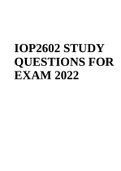IOP2602 STUDY
QUESTIONS FOR
EXAM 2022
,IOP2602 - ORGANISATIONAL PSYCHOLOGY
CHAPTER 1
Concentrate on “Disciplines that contribute to the OB fields”
Organisational behaviour is an applied behavioural science built on contributions from a number of
behavioural disciplines, mainly psychology and social psychology, sociology and anthropology.
Psychology’s contributions have been mainly at the individual or micro level of analysis, while the other
disciplines have contributed to our understanding of macro concepts, such as group processes and
organization.
REVIEW QUESTIONS
1. What is the importance of interpersonal skills?
For a manager to have interpersonal skills I personally think is the most important and crucial attribute
to have as a manger, reason being that once a manger have this skill they will be able to make better
decisions when it comes to working with people. In this way managers will be able to attract and keep
high-performing employees which are always in short supply in the market. Mangers who have a good
social relationship among their co-workers and subordinates have resulted in overall job satisfaction,
lower stress, and lower intentions to quit. So, having managers with good interpersonal skills is likely to
make the workplace more pleasant, which in turn makes it easier to hire and keep qualified people.
Creating a pleasant workplace also appears to make good economic sense and which also result in
effective teamwork, positive and healthy working relationships, job satisfaction and a willingness to go
the extra mile amongst employees and within the organization.
2. What do managers do in terms of functions, roles, and skills?
The functions managers do is Planning, Organizing, Leading, and Controlling. The roles mangers take
part in is called Interpersonal roles, Informational roles, and Decisional roles. The skills managers need
are Technical skills, Human skills and, Conceptual skills.
3. What is organizational behaviour (OB)?
A field of study that investigates the impact that individual, groups and structure have on behaviour
within organisations, for the purpose of applying such knowledge toward improving an organisations
effectiveness.
4. Why is it important to complement intuition with systematic study?
The reason why it is important to complement intuition with systematic study is because without the
implementation of systematic studies and just the use of complement intuition erroneous predictions
result. Systematic study makes it possible to make reasonably accurate predictions.
, 5. What are the major behavioural science disciplines that contribute to OB?
Psychology, Social psychology, Sociology, and anthropology
6. Why are there few absolutes in OB?
There are few absolutes in organisational behaviour as human beings are complex. They are not alike,
our ability to make simple, accurate and sweeping generalization is limited, so they follow system
approach and contingency approach.
7. What are the challenges and opportunities for managers in using OB concepts?
Responding to economic pressures
Responding to globalization
Managing workforce diversity
Improving customer service
Improving people skills
Stimulating innovation and change
Coping with temporariness
Working in networked organisations
Helping employees balance work-life conflicts
Creating a positive work environment and
Improving ethical behaviour.
8. What are the three levels of analysis in this book’s OB model?
Input, process, and outcome
Study Guide
1. The single biggest reason for managerial failure is poor interpersonal skills
2. Henri Fayol was French industrialist who wrote that all managers perform five managerial functions.
3. The four managerial functions include all the following, except staffing (control, planning &
organizing)
4. The three levels of analysis studied in organisational behaviour are individuals, groups and
organisational systems




